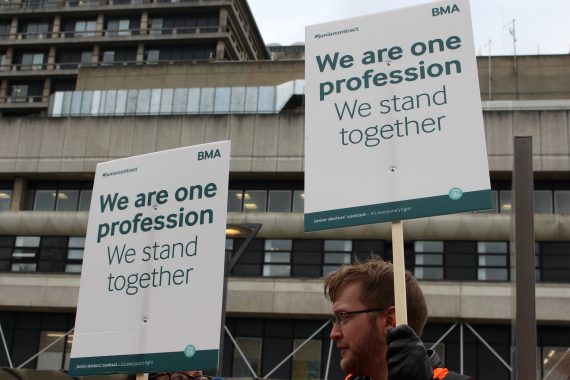GP practices told not to book patient appointments for junior doctor strike days

Exclusive GP practices have been told by NHS England and CCGs not to accept appointment bookings for the upcoming all-out junior doctor strike dates.
The letter to practices in Yorkshire and the Humber said they should cancel staff training and not pre-book appointments during the junior doctors strike – which also coincides with the start of the ’Tour de Yorkshire’ cycle race.
A letter to practice managers stated that the 26 to 29 April should be kept as free as possible to ‘mitigate the impact’ of industrial action – when junior doctors will suspend all labour including urgent and emergency care – and the cycle race.
The letter said: ’Yorkshire and the Humber CCGs and NHS England have agreed that due to the Tour de Yorkshire and impact of the impending industrial action:
- No more appointments should be booked for 26, 27, 28, 29 April in order to maximise on the day appointments to mitigate the impact from the industrial action and Tour de Yorkshire
- Practices should suspend practice training time planned for this period and therefore be open for physical appointments.’
But Doncaster LMC did not welcome the letter, which it feared would encourage more people to go see their GP rather than attending hospital if they needed to.
Medical secretary Dr Dean Eggitt said he has been ‘frustrated’ by NHS England’s communications which he said meant patients were ’scared to go to hospital’.
He said: ’NHS England has completely ignored the fact that general practice has had to bear the burden of several junior doctors strikes already, so it’s interesting to see their ears have finally pricked up to the fact general practice exists.
’They have done absolutely nothing to help our capacity. They have just reminded us of our duty to have capacity available when this happens.’
Deputy GPC chair Dr Richard Vautrey said it’s ‘for practices to decide how they ensure all their patients can access appropriate care, something they do day in and day out’.
He said: ’Practices have been very supportive of action taken by trainees over the last few months and have ensured that patient services have been maintained when GP trainees have not been present. I’ve no doubt that practices will do this again during further periods of action.’
NHS England said its Yorkshire and Humber team had been been ‘working hard to ensure patients will continue to have access to high-quality primary care services during the next planned days of industrial action by junior doctors, and the Tour de Yorkshire cycling race, which begins shortly after’.
A spokesperson said: ’Amongst the recommendations made to GP practices is to suspend practice training time and to ensure, where possible, no appointments are pre-booked for 26-29 April, in order to maximise on-the-day appointments’.
‘GP practices have been asked to consider and support these proposals to allow patients to see a local GP urgently, if they require one.’
The Tour de Yorkshire cross-county cycling race starts in Beverley, East Yorkshire, on 29 April.
A historic walkout
The 48-hour industrial action planned for 26 and 27 April is historic because it is unprecedented within the NHS for doctors to withdraw all labour including emergency care.
Announcing the plans last month, the BMA’s junior doctor committee Dr Johann Malawana said the Government had left them with ‘no choice’.
Health secretary Jeremy Hunt announced in February that he was imposing a contract on junior doctors, and junior doctors have already staged four rounds of action in protest, during which they did provide urgent and emergency care.
The action is backed by a BMA ballot in which 98% of junior doctors supported strike action, including a potential all-out strike.
Talks between the Government and BMA broke down over the issue of evening and weekend pay, with the Government refusing to step back from its decision to remove ‘unsociable hours’ pay premiums from Saturdays and weekday evenings.
The BMA is also taking the Government to judicial review, arguing that the Government failed to carry out an equality impact assessment before the imposition.
Pulse July survey
Take our July 2025 survey to potentially win £1.000 worth of tokens














